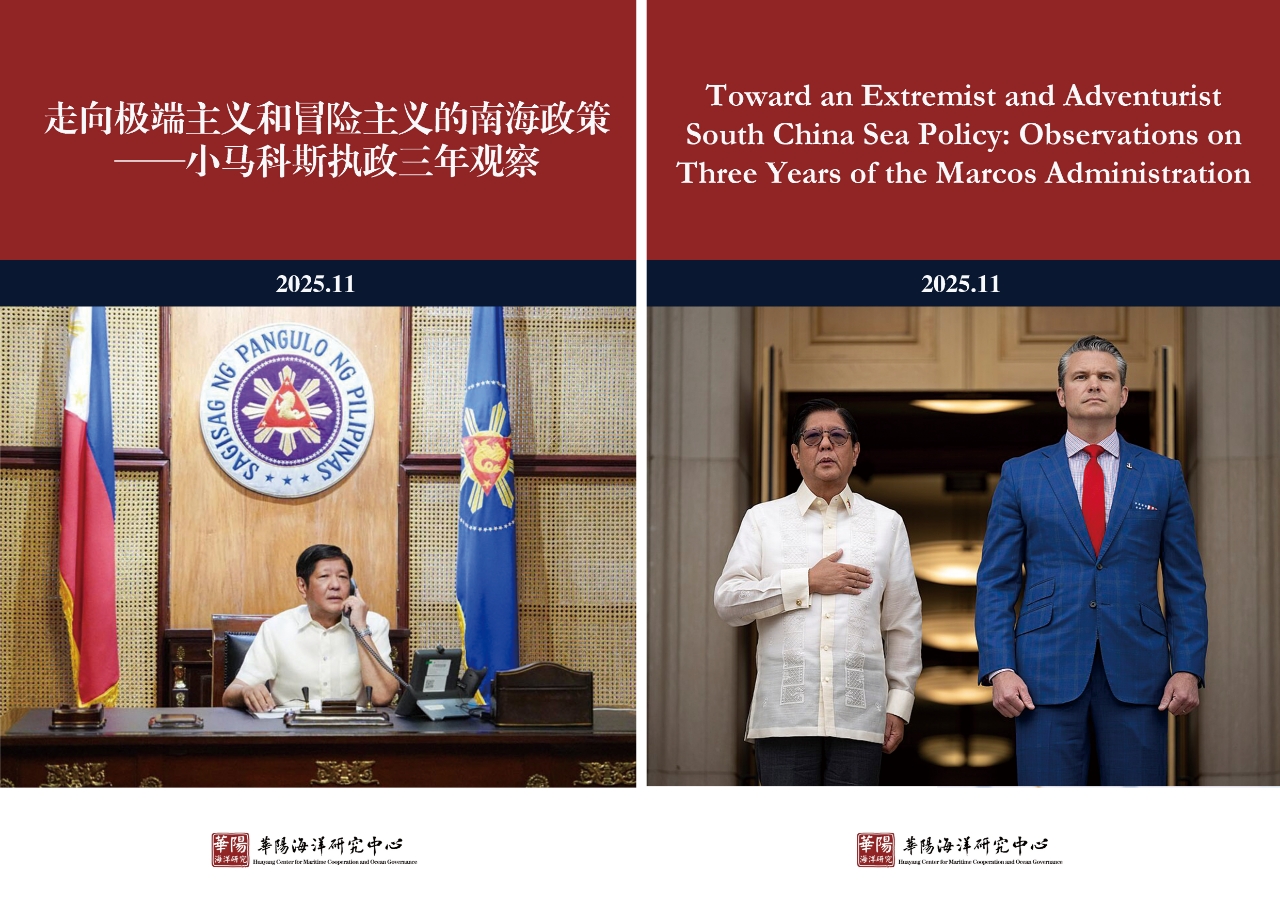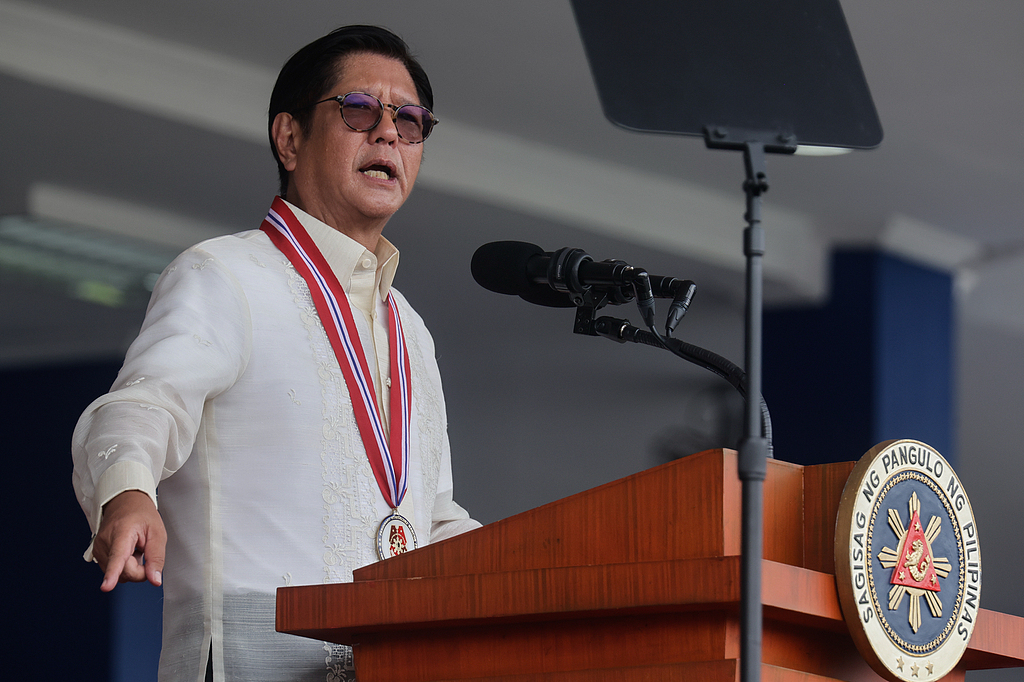At the closing ceremony of the 47th ASEAN Summit, Philippine President Ferdinand Marcos Jr., whose country will assume the ASEAN Chairmanship in 2026, pledged to uphold the theme of "Navigate our Future, Together" in guiding ASEAN towards a more inclusive and sustainable future. He also committed to advancing the conclusion of the "Code of Conduct in the South China Sea" next year.
However, given the various actions taken by the Marcos administration in the South China Sea since assuming office, whether the Philippines can "match its words with deeds" has sparked considerable discussion.

On November 4th, the Chinese think tank Huayang Center for Maritime Cooperation and Ocean Governance released a report titled "Toward an Extremist and Adventurist South China Sea Policy: Observations on Three Years of the Marcos Administration". Based on objective facts and detailed data, the report provides a comprehensive analysis of the nature of the Marcos government's foreign policy and South China Sea claims.
What are the internal and external drivers behind the current Philippine government's South China Sea policy? Looking ahead, where will the Philippines, as the incoming chair of ASEAN, steer the South China Sea issue? CMG Voice of the South China Sea conducted exclusive interviews with Xu Xiaodong, Vice Chairman of the Huayang Center for Maritime Cooperation and Ocean Governance; Chen Xiangmiao, Director of Center for South China Sea History and Culture, National Institute for South China Sea Studies; Zhang Jie, Head of Department of Asia-Pacific Security and Diplomatic Studies, National Institute of International Strategy, Chinese Academy of Social Sciences; and Anna Malindog-Uy, a Philippine political scholar, for their interpretations based on the report and these questions.
VSCS: Why did the Huayang Center release this report at this time?
Xu Xiaodong: Over the past three years since taking office, the Marcos administration has certainly made its presence felt on the South China Sea issue. Its approach has been remarkably adventurous in attitude, diverse in methods, unrestrained in sentiment, and low in credibility, arguably the most pronounced among successive Philippine governments.
However, the deceptive, extreme, and risky foreign and South China Sea policies of the Marcos administration neither help improve the Philippines' domestic governance and people's livelihood nor contribute to the proper management of South China Sea disputes. The report released by the Huayang Center aims to "clarify the true nature of the South China Sea issue and trace the source of the disputes," informing the international community, including the Philippine public: Who is the real instigator of the South China Sea disputes and the behind-the-scenes manipulator?
The Philippines will assume the ASEAN Chairmanship next year, and 2026 also marks the 10th anniversary of the so-called "South China Sea arbitration award". We also hope this report can generate momentum in public opinion, alerting the Philippines to its responsibilities as a coastal state, and steering the South China Sea issue back to the right path of resolution through negotiation and consultation.
VSCS: Based on this report, what changes and characteristics can be observed in the Marcos administration's South China Sea policy?
Chen Xiangmiao: The most defining features of the Marcos administration's South China Sea policy are its extremism and adventurism. This is reflected in the Philippine government's departure from fundamental norms and principles of modern international relations when handling South China Sea disputes, discarding established consensus, breaking conventional arrangements, and acting impulsively, boldly, arbitrarily, and irrationally.
Several factors drive this shift. Although the Philippines adopts an American-style democratic political system, deeply entrenched political families constitute another influential force, exerting an absolute impact on its domestic and foreign policies. This often leads to the interests of political blocs superseding the national interest of the Philippines. The sharp turn of the Philippines' South China Sea policy from the relative stability during the Duterte administration towards an "extreme" tendency results from the interaction among three political groups – political families, the bureaucratic bloc, and the elite class – under the strong influence of the United States.
Anna Malindog-Uy: During President Duterte's term, he pursued an "independent foreign policy", advocating relative neutrality between China and the US. In contrast, the foreign policy direction under President Marcos Jr. has noticeably leaned towards the United States. On the South China Sea issue, the Marcos Jr. administration has adopted a more confrontational stance and is pushing for the internationalization of the issue, aiming to bring the maritime disputes to a broader international stage.
Behind this policy shift, a significant reason lies in the Marcos Jr. government's firm belief that its South China Sea strategy should be based on "deterrence". In practical terms, this necessitates moving closer to the United States and its allies in the realm of military and defense cooperation – the United States-Philippines Mutual Defense Treaty is the core embodiment of this strategic logic. Furthermore, the South China Sea issue plays a role in stirring nationalist sentiments within Philippine domestic politics, particularly when maritime friction or conflicts occur with China, making such emotions easier to ignite.

VSCS: How should we assess the role of the United States in the adjustment of the current Philippine government's South China Sea policy, and what are its fundamental intentions?
Chen Xiangmiao: After the U.S. military withdrew from Subic Bay Naval Base in 1992, a power vacuum existed in the South China Sea region for a long time. With the US proposing the so-called "Pivot to Asia" or "Asia-Pacific Rebalance", and later the "Indo-Pacific Strategy", it has sought to consolidate the Philippines' position within the "first island chain". Consequently, we have observed that since the Biden administration took office, the U.S. has intensified upgraded military and defense cooperation with the Philippines.
The United States does not wish to see a rapprochement between China and the Philippines regarding the South China Sea issue. An escalation of Sino-Philippine maritime tensions is most advantageous for the U.S.. Therefore, the U.S. consistently uses the Philippines to contain China, mobilizing it to act as a pawn in countering China. The U.S. continuously influences the Philippines' South China Sea policy through military means involving its Coast Guard and armed forces, courting allies from outside the region, and providing economic assistance. Regarding specific maritime operations, US intelligence agencies and think tanks also constantly provide various forms of support and proposed plans.
Zhang Jie: The United States hopes the Philippines will become a "bridgehead" for containing China. Regarding the Philippines' current overall South China Sea policy, the U.S. is the "engine". The US is also the "transfuser" for the Philippines' present South China Sea policy. The disparity in maritime capabilities between the Philippines and China is vast. Why does the Philippines still dare to repeatedly provoke China? This is inseparable from U.S. support behind the scenes. Utilizing their mutual defense treaty, the U.S. has deployed numerous military bases in the Philippines, stationed some of its most advanced intermediate-range missile systems there, and continuously "transfuses" support to the Philippines. It can be said that without the United States, there would not be the current provocative actions by the Philippines, nor the present turbulent situation in the South China Sea.
VSCS: What potential changes might the Philippines, as the incoming Chair of ASEAN, bring to China-related and South China Sea affairs next year?
Chen Xiangmiao: From the perspective of ASEAN countries, they seek to prevent the South China Sea issue from becoming a priority factor in China-ASEAN relations. Given the current situation, especially against the backdrop of the US tariff war, I believe ASEAN countries' economic demands from China will likely increase. Regarding the South China Sea issue, their willingness to ease tensions concerning it might be stronger than it is now. My concern lies with the variable introduced by the Philippines. As next year's Chair of ASEAN, it effectively holds priority and leading power in setting the agenda.
Zhang Jie: Last year, during field research in countries like Indonesia and Malaysia, I found that many Southeast Asian nations actually consider the Philippines an "outlier" within ASEAN because it completely disregards the "ASEAN Way" and has fully aligned itself with the United States. However, ASEAN indeed has its own set of mechanisms, including the principle of decision-making by consensus – the ASEAN Way. Regardless of who chairs ASEAN, these mechanisms impose certain constraints.
On the other hand, the Philippines' own influence within ASEAN is not particularly high. Therefore, whether from the perspective of building its national image or handling ASEAN affairs, the feasibility of the Philippines hijacking ASEAN to serve its so-called South China Sea policy should be relatively low. Conversely, the constraints of ASEAN mechanisms might force it to "show some restraint".
VSCS: How do you view the future development of China-Philippines relations?
Anna Malindog-Uy: The bilateral relationship between China and the Philippines should not be defined solely by the South China Sea issue. Instead, it should be shaped more by cooperation in numerous other areas such as the economy, people-to-people exchanges, education, among others. Looking back at the bilateral relations between our two countries, this diplomatic relationship has lasted for half a century. We should strive to focus on fostering cooperation in the South China Sea. As long as agreement can be reached in certain areas, positive outcomes can be generated. I hope the Marcos administration can establish a truly productive cooperative relationship with China and, after assuming the ASEAN Chairmanship, genuinely and actively promote the early conclusion of the "Code of Conduct in the South China Sea".
Chen Xiangmiao: If we could set aside the South China Sea issue, I see no reason why China and the Philippines should not engage in cooperation. Although the U.S. and Japan have promised the Philippines various forms of investment support, what they can offer does not meet the Philippines' most critical needs. What does the Philippines need? It needs infrastructure construction, energy development, improvement of people's livelihoods, etc. Cooperation with China can precisely provide assistance in these areas. China possesses globally leading marine aquaculture capabilities. Sino-Philippine cooperation could genuinely help the Philippines resolve the livelihood issues of its fishermen, rather than letting Filipino fishermen become political pawns.

